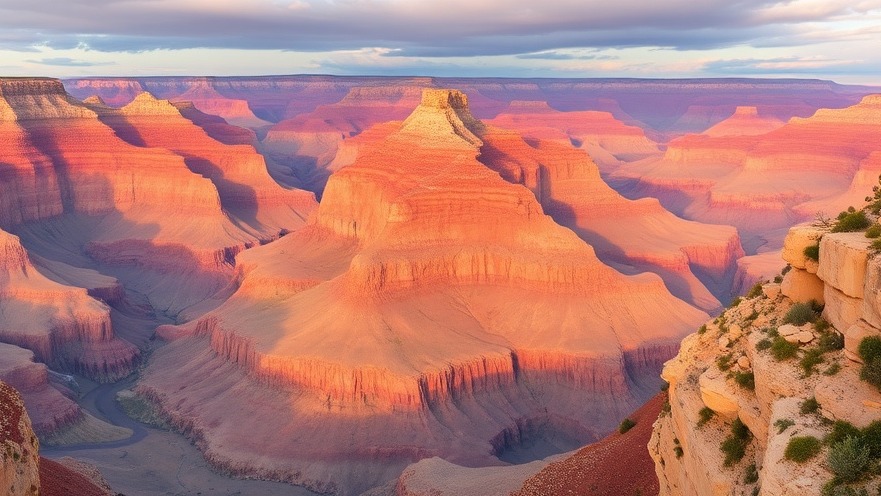
The Grand Canyon: A Natural Wonder Under Threat
The Grand Canyon represents not just a stunning natural sight, but also a vital region for both the local economy and Indigenous communities. Recent discussions have indicated potential rollbacks of mining protections for this breathtaking landmark, raising concerns about environmental and cultural impacts. In these talks, U.S. Senator Ruben Gallego emphasized the need for protections that safeguard this precious area, which is not only the second most visited national park in the United States but also a significant economic driver for northern Arizona, attracting millions of visitors every year.
In 'Ruben Gallego Asks Energy Nom About Possible Rollback Of Mining Protections For The Grand Canyon,' the discussion dives into the urgent need for environmental protections surrounding the Grand Canyon, prompting a deeper analysis of the implications for federal legislation and Indigenous rights.
Understanding the Stakes: Why Protecting the Grand Canyon Matters
With 80% of Arizonans supporting the protection of the Grand Canyon's ancestral footprints, it's clear that the area holds immense cultural and economic importance. For many tribes, including the Navajo, Hopi, and San Juan Southern Paiute, the Grand Canyon is a sacred site that is deeply intertwined with their heritage. The proposed rollbacks threaten not only the environmental safety of the area but also the economic stability for local tribes, who rely on the balanced ecosystem for their livelihood. Senator Gallego's urgent call for action highlights that the stakes are high—not just for Arizona, but for the entire U.S.
The Drought Challenge: An Urgent Call for Action
Beyond the Grand Canyon’s immediate vicinity, the West is grappling with severe drought conditions that further complicate the situation. The Colorado River, the lifeblood for millions, is stretching thin, placing pressure on funding mechanisms that allow for sustainable water management in the region. Senator Gallego raised concerns over potential funding freezes and pressures to align seven states’ agreements on water usage, urging that timely action is essential not only for economic stability but also for vital ecosystem preservation.
Nuclear Energy: A Viable Solution for Arizona's Future?
As discussions continue about energy solutions in Arizona, the potential deployment of small modular reactors (SMRs) has caught Senator Gallego's attention. By advocating for nuclear energy as a sustainable solution to meet rising energy demands, local communities stand to benefit significantly. With one of the largest nuclear plants already in operation in the state, the senator envisions collaborative efforts to introduce innovative energy solutions in tandem with traditional conservation efforts, offering a dual approach to manage resource utilization effectively while preserving ecological integrity.
Perspectives from Tribal Leadership
The importance of balancing economic growth with cultural preservation cannot be overstated. Conversations with tribal leaders, such as those from the Navajo Nation, indicate that they seek not just acknowledgment but active partnership in decision-making processes. Securing water rights and infrastructure funding through the northeastern Arizona Indian water rights settlement act is paramount to ensuring that tribes can thrive—having access to water not only sustains their communities but also respects the cultural significance of their ancestral lands.
Political Ramifications: What's Next?
As the pressures of national interests clash with local needs, the outcomes of these discussions will have lasting implications on public policy and local governance. The interplay of energy policies, environmental protections, and Indigenous rights requires careful navigation by lawmakers, emphasizing the importance of bipartisan collaboration. Senator Gallego's efforts in Congress are critical not just locally but reflect broader themes in national political discourse surrounding water rights and resource management.
In light of these vital discussions, it's imperative for the advocacy for protections surrounding the Grand Canyon to continue. As stakeholders from various sectors join forces, the resulting dialogue could pave the way for effective long-term solutions that prioritize sustainability, respect for cultures, and the economic well-being of communities.
For concerned citizens who care about protecting our national treasures, it’s time to stay informed and engaged. Advocacy on matters like water rights and conservation efforts in states like Arizona is crucial as we move forward. Engage with local initiatives, write to your representatives, and make your voice heard to protect places like the Grand Canyon for generations to come.
 Add Element
Add Element  Add Row
Add Row 



 Add Row
Add Row  Add
Add 


Write A Comment